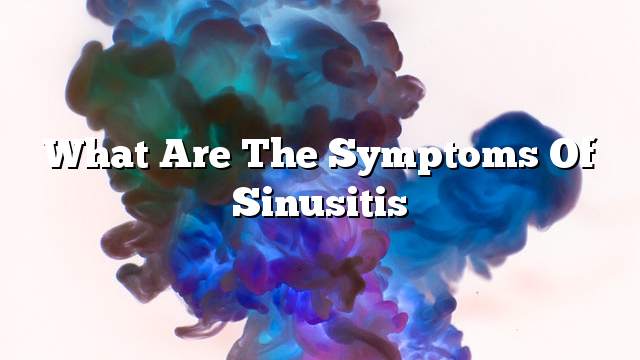paranasal sinuses
Sinus is a small cavity filled with air inside the bones of the skull (forehead and hips), the largest ones in the cheek and its width is about 2.5 cm (2.5 cm) and the other is much smaller. These pockets are distributed as follows:
- The largest sinuses: Located in the cheekbones.
- Frontal sinuses : Located in the lower middle part of the front.
- Western Sinus : It lies between the eyes.
- Sinus sinus : Located in the bone behind the nose.
These pockets are covered with a mucous membrane thin pink, and in the normal state is empty except for a thin layer of mucus. The function of these sinuses is almost unknown, but one theory claims to help moisturize the air that a person breathes, while others say it works to strengthen the human voice.
Types of sinusitis
Sinusitis is inflammation of the lining mucosa, which has several types:
- Acute sinusitis : It usually lasts for less than 4 weeks, and its symptoms suddenly appear to be similar to symptoms of colds.
- Sinusitis below the acute : It extends from 4 weeks to 12 weeks.
- Chronic sinusitis : It lasts for more than 12 weeks and is likely to last for months or even years.
- Recurrent sinusitis : Where the patient has multiple episodes of inflammation during the year.
Symptoms of sinusitis
There are many symptoms of sinusitis, and does not require meeting together at the same patient, and similar symptoms and signs in the different types of sinusitis, but in the case of chronic inflammation two of these symptoms are required to diagnose, including:
- The secretion of dense yellow or green substance from the nose, or sensation in the back of the throat.
- Nasal obstruction or congestion; making nasal breathing difficult.
- Pain and swelling around the eyes, or in the cheeks, or in the nose, or in the front, of course, according to the pocket infected with inflammation.
- Decrease in sense of smell and taste.
- Pain in the ears.
- Pain in the upper jaw or teeth.
- Cough, which can get worse at night, is usually accompanied by phlegm.
- Sore throat.
- Smelly mouth odor.
- General fatigue or disorder.
- Breathing through the mouth, due to clogged nose.
- Redness in the nose, cheeks, or eyelids.
- High temperature, in the case of bacterial infection.
- Sensation of obstruction or pressure in the ear.
- nausea.
Causes of Sinusitis
The causes of sinusitis include:
- Cold and flu : In most cases, the cause of inflammation is the result of exposure to cold, or exposure to a similar disease, for example, the entry of viruses causing viral inflammation in them, as in the entry of bacteria that cause inflammation of the bacteria, which makes the situation worse, or a change in the wall The pockets are padded.
- Inflammation of teeth In some cases the infection may spread from infected teeth to the place of the nasal sinuses.
- Infectious infections .
The reasons for the doctor’s review
Most cases of acute sinusitis do not require a doctor, and in all cases should see a doctor if the patient suffered from:
The most vulnerable groups are sinusitis
The following factors increase the incidence of chronic or recurrent sinusitis:
- The presence of a defect in the nasal passages : The deviation of the nasal barrier or the presence of benign tumors in the nose (or so-called fluid).
- Allergy to aspirin : Causing respiratory problems.
- Disorders of the immune system Such as HIV infection.
- Hay fever or any other allergies .
- asthma : One out of five people with chronic sinusitis already suffers from asthma.
- Persistent exposure to contaminants Such as cigarette smoke.
Complications of sinusitis
Complications of sinusitis are rare, especially if treated properly, and the different types of inflammation of the complications also include:
- Meningitis : Inflammation of membranes and fluid surrounding the brain and spinal cord.
- Loss of sense of smell permanently or temporarily : It may be the result of nasal obstruction and inflammation of the olfactory nerve.
- Loss of vision : This occurs in the case of transmission of inflammation to the eye quarry, resulting in vision or even blindness that may be permanent.
- Damage to the brain : The formation of the so-called mother of blood (swelling of the wall of the vessel) and thus vulnerable to rupture, or the formation of clot, which affects the blood feeding of the brain causing strokes.
- The emergence of other infections : Which is not common, for example if the inflammation moved to the bone causing inflammation and so on.
Self-treatment of sinusitis
The following steps help relieve sinusitis:
- Comforts : Helps to strengthen the body’s immunity.
- Drink fluids : As water and juice as it helps to ease mucus secretions and facilitate the exit, and also avoid drinks containing caffeine and alcoholic beverages.
- Sinus hydration : This is by inhaling steam from a container in which hot water, where the steam helps to relieve the pain and exit mucus secretions.
- Place warm compresses On the face (around the nose, cheeks, and eyes) to relieve the pain.
